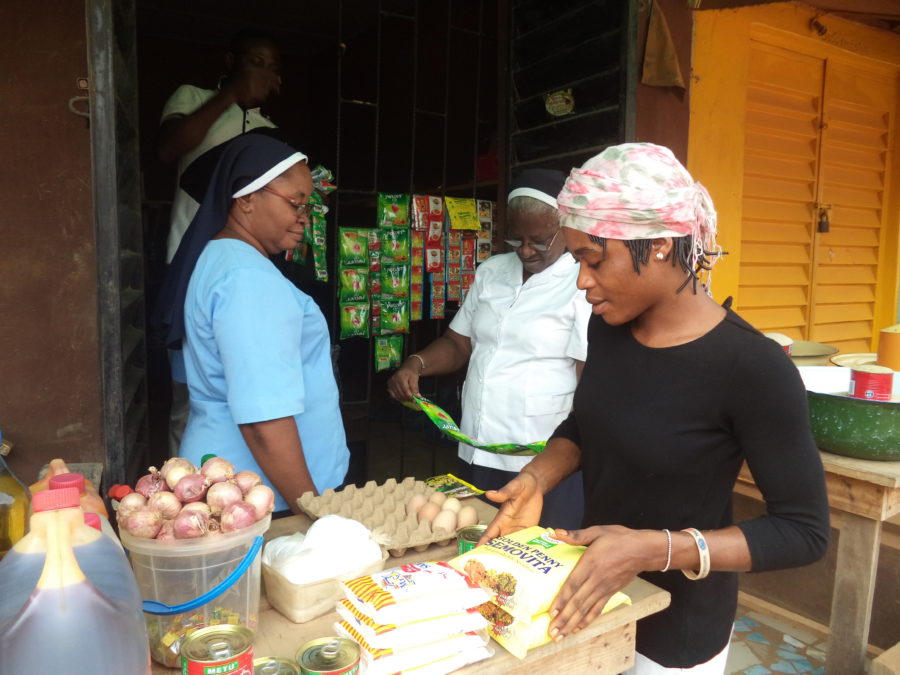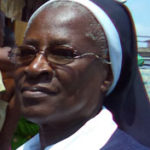6th December 2017 Holy See
The fight to end human trafficking: Nigerian women religious’ perspective

To mark the UN-led 16 Days of Activism to End Violence against Women and Girls, the British Embassy to the Holy See is delighted to introduce you to Sr. Patricia Ebegbulem, whose network of religious sisters in Nigeria is trying to make a reality of the UN’s theme “Leave no-one behind” for modern slavery victims and their children. Read on to find out more about her inspiring work.
In 1998, the Nigeria Conference of Women Religious Leaders was alarmed and appalled at the many Nigerian women who were involved in sex slavery in Europe. In Italy alone, there were over 15,000 then caught up – mostly totally against their will – in forced prostitution. Thousands of women and girls were being trafficked from developing countries and brought into conditions in which their basic human rights were seriously violated.
These Major Superiors of the Nigeria Conference of Women Religious (Catholic Reverend Sisters) were so touched by this obvious exploitation of the Nigerian women and children involved in human trafficking both internationally and in Nigeria, that they felt a strong need to put up a fight to liberate these women and children from the shackles of their slave drivers.
This strong urge to liberate our women and children led to the establishment of the Committee for the Support of the Dignity of Women (COSUDOW) in April 1999 in Benin City, Nigeria. Since then, the Committee has been in the forefront of fighting this ‘new form of slavery.’ In the year, 2007, this fight against human trafficking embraced women religious in the African continent with the birth of the African network Against Human Trafficking (ANAHT). The idea behind this was to start networking among religious sisters in countries of origin, transit and destination.
In Bakhita Villa, Lagos, Nigeria, women religious have a shelter for the rehabilitation and reintegration of victims of human trafficking and from where they carry out activities for the prevention of human trafficking. Our work of Rehabilitation, Reorientation and Reintegration is carried out on each victim of human trafficking.
Rehabilitation takes place in the Shelter and consists of counseling, spiritual direction and taking care of the needs of the victims. Most of these victims come to us battered and shattered. The traumatic nature of their experience requires great care and this is what we give through counselling and spiritual direction. When they arrive at our shelters we begin by celebrating their lives. They receive counselling and pastoral care.
During their stay in the shelter they are prepared for quality life in the society. The goal is for them to go and be reintegrated into the society so that they live a good quality life in dignity and live life to the full. To this end, those who already have skills are encouraged to perfect and update their skills and those who have none are encouraged to learn and acquire skills according to their interest and ability. With this begins the true reintegration. After skills acquisition, these survivors are empowered and equipped with materials to enable them run and operate their own businesses, to support themselves and their families. This is one of the ways we tackle poverty which is a major ingredient in human trafficking in the developing countries. By establishing them in a trade, we reduce their vulnerability and the danger of being re-trafficked.
Realising the fact that Prevention is key to putting an end to trafficking in persons, we came up with a Handbook for Schools on ‘Stop Trafficking in Women & Children: It is a Crime against Humanity’. This book is being used extensively is schools, churches, among women groups and youth centres to educate all especially the vulnerable and potential victims on the dangers of trafficking in persons.
Although many harrowing tales of exploitation and abuse are widely publicised during our Prevention Programs of Sensitisation and Awareness Creation, the flow of women from Nigeria continues unabated. And this remains a great concern to all of us.

I will be happy if Nigerian girls here in Ghana, involved in human trafficking and prostitutions will be arrested and brought to book. For the atrocities they have committed to our fellow human being and the world. They bring this girls enter an agreement for this girls to pay them between #500,000 to #800,000 naira. Before getting freedom. Pls am ready to work with anybody or agency to stop this evil act.